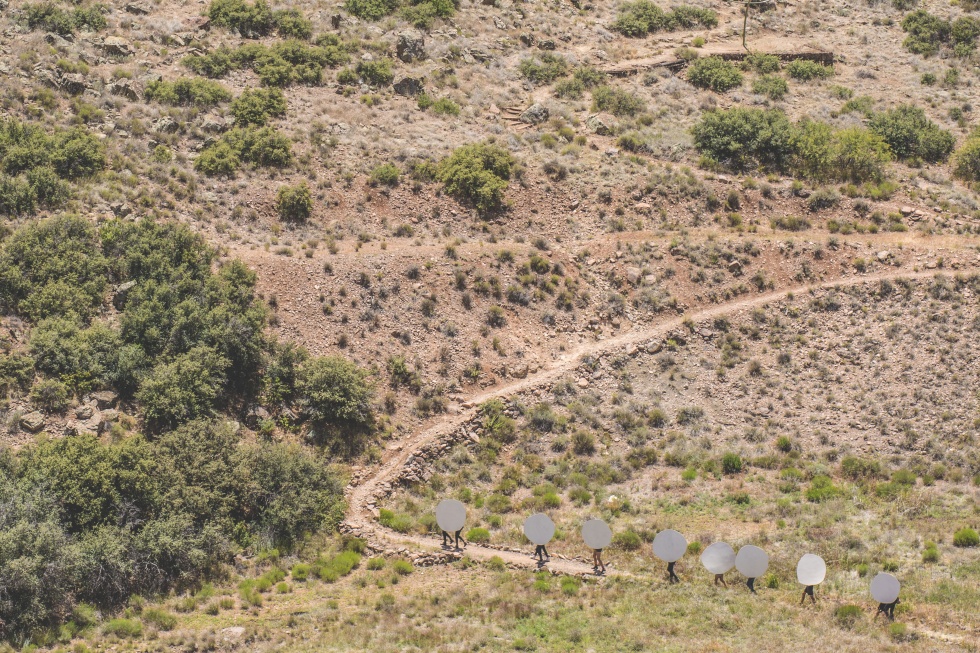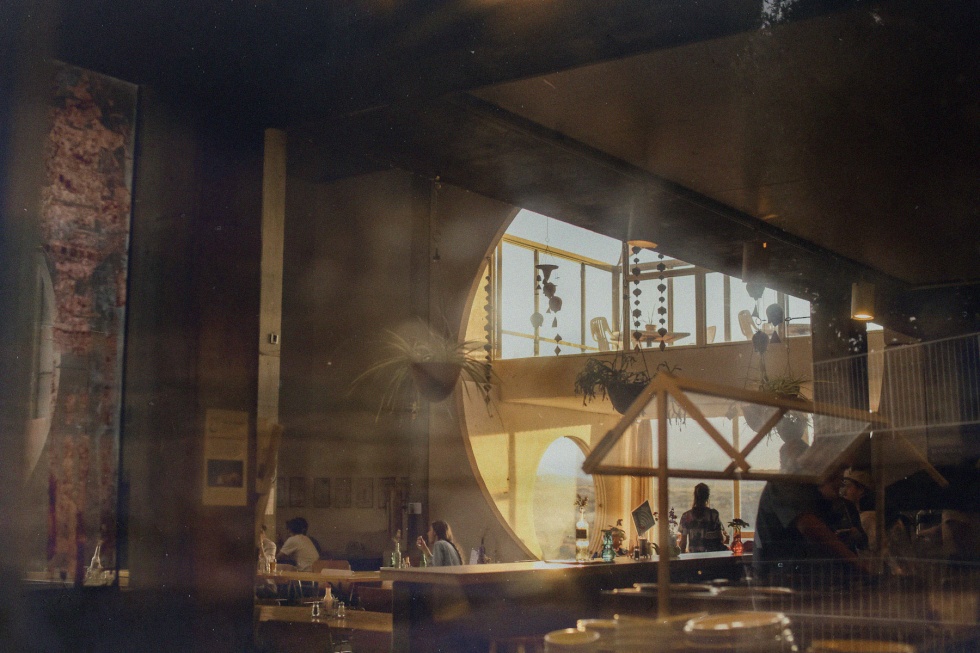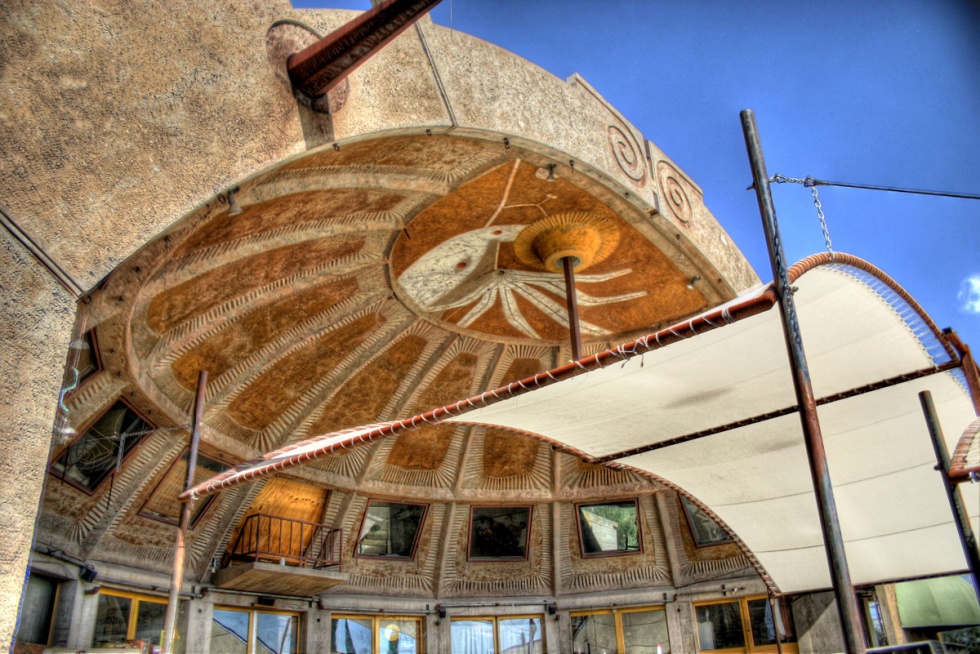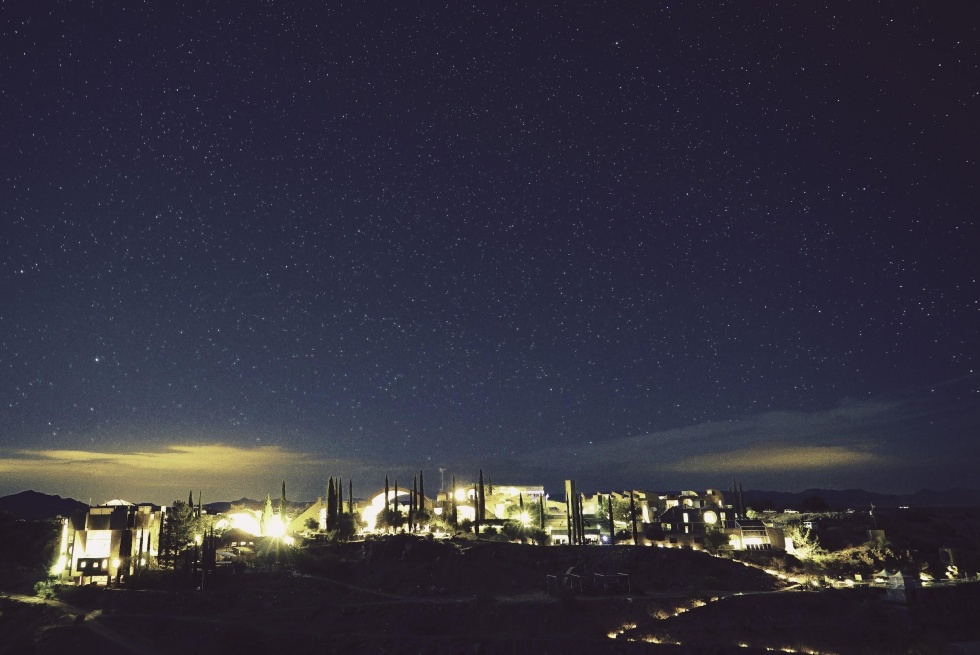Curated and organised by Hundred Waters, FORM is a forward dreaming take on the traditional music festival format. The free by application, three day festival, blurs the lines between performers and attendees, and takes place over the course of three days at Arcosanti in Arizona. An experimental town designed by Italian-American architect Paolo Soleri, Arcosanti was conceptualised as a foray into the realm of architecture, urban planning, and ecology. The performances at Arcosanti are deeply tied to the location’s unique location and surroundings, and present a unique opportunity for artists to present their work in a the context of a futuristic, desert utopia.
Ahead of the festival, we spoke with Autre Ne Veut, Ash Koosha, Braids, Perfume Genius, and Son Lux on how environment impacts the creative process as well as live performance itself.
ON ENVIRONMENT & THE CREATIVE PROCESS
AUTRE NE VEUT
The most inconvenient places to write music are usually the places where I have the best strokes of creative juice. I’ll be on the subway, and suddenly a solid melodic line will pop into my mind. I’ll then have to open up my Garageband app and play some goofy synths on my iPhone, sing melodies into it, and make the basis of a song.
“Inconvenience definitely inspires creativity for me.”
Inconvenience definitely inspires creativity for me. I’ve written music in two types of places. I’ve had home studios, and I’ve functioned in larger, more formal studios. A major key for me is actually daylight. I’m a daytime worker, and I like studios with windows. That’s really all I need to feel like I can get a lot of work done.
Almost all my writing happens either at home or while I’m walking around. The writing part is mostly inspired by living. I’ll have a thought about something or someone who’s important to me, or I’ll have a relational issue, or think about global politics, and just start writing lyrics and melodic ideas around those phrases. I’m at this point where being in a studio is exciting because you can be confident that your ideas are being articulated clearly and well.

However, there’s something incredible about being home, having all your things set up the way you like them, taking your time, and the opportunity to make slow music. Not musically slow, but the slow food version of music when you don’t have the type of pressures and time constraints in place at a studio.
Conversely, sometimes being on a time crunch can be inspiring and exciting also. It definitely impacts you, but as I get older, my experience with space in a non-architectural sense has shifted—as long as I have sunlight I’m pretty happy and can figure something out.
ASH KOOSHA
My work is based on impulses and random emotions that come to me, and I have to let them out and express it. I’m always prepared. I live isolated in a way, so I’m always ready to nail it down, record and mix it at that moment. If the moment is gone for me, that track and possibility is gone. I try to go outside, build up my sound archive, record sound, and spend most of my time at home in my studio on the computer.
I try to stay in my space. I don’t go to many gigs, club nights, or loud places, because I create that space in my room in my head. I try to deal with information rather than a lot of outdoor spaces.
BRAIDS
Austin Tufts: The genesis of our latest project took place over the course of the writing retreat we did. That one has a lot of geographical breadth. Some of the songs were started in the desert, tinkered with in upstate New York, tinkered with again in Vermont and had not been finished until we came back to our black box in Montreal. I don’t think there’s a direct correlation between geographical environment and the kind of song we’re writing, but it impacts our mindset and workflow.
When we first initially set out to write Deep in the Iris, we really wanted to go to the desert because that was the exact antithesis of what we worked on before. So much of our work was done in small little garages—like a one car garage converted into a recording studio here. It’s very dull sounding, there are no windows, and it’s very claustrophobic. It’s a very good place to go and get shit done and a great place to rehearse, but we wanted to have something like the expansive, sunny, and powerful environment that the desert offers.
“Just being able to spend the time walking and hiking, submerged in nature and isolated from everything else, set a tone of calm”
When we went there, just being able to spend the time walking and hiking, submerged in nature and isolated from everything else, set a tone of calm and reflection on the whole record which deeply impacted the lyrics on it. I’m really excited to be performing at FORM because it’s only an hour away from the cabin where we recorded the first couple songs of the record. It’s going to be full circle for us.

PERFUME GENIUS
I’m kind of shy and I tend to get very anxious, but when I’m writing by myself that all goes away. I forget for a minute that that music will be listened to and performed, and that’s when I feel free. When I’m in the studio, not only am I more aware that I’m going to release it, but it’s also more of a business environment. And there are people there while I’m actually singing and stuff, of course. It was hard to find the balance at first and feel like I was being honest while making the songs. It was more self-aware.
I enjoy being isolated. I’m not sure I need to be isolated, but I at least think I do. The room has to be only for writing music, and it has to be easy. Everything’s set up, secluded, and just for making music. Kind of like how people don’t put a TV in their bedrooms because it’s too confusing—to have your room just be for sleep. I don’t do that for any part of my life other than music. My mind is all over the place, and my living space is all over the place and messy. The music area’s a little more sacred. I take care of it more.
Lately I have my piano set up in the attic of our house. My third album was recorded in this weird closet-y room in a house we lived in before. My music changed a lot when I moved into a house. The second album was written in an apartment where I shared walls with other people and I was very worried people could hear me when I was writing. I could never let loose, but since we moved into a house, I can scream and do things that are more embarrassing to be overheard. My music has changed a lot because of that freedom.

ON ENVIRONMENT & PERFORMANCE
AUTRE NE VEUT
The relationship between artist and performance space is a much stronger one. A performance, on some level, is a recreation of something that already exists. In another sense, it’s its own thing that only exists in that one context and moment. Where your body’s at and environment in relationship to your physicality, health, sense of self, ego, all play a much bigger role in the context of live performance.
“A performance, on some level, is a recreation of something that already exists. In another sense, it’s its own thing that only exists in that one context and moment.”
Feeling like you’re communicating effectively, and audience feedback is a big part of that as well. That’s why I’m so excited to do FORM Arcosanti. If you get to a certain level as an artist, you can play Red Rocks, sell it out, and then you’re in a beautiful natural environment. But at the tier of artist I’m at now, this is a once in a lifetime opportunity—to be in such an idyllic space.
ASH KOOSHA
“In terms of performances, I feel like most of electronic artists they play you the result of their process. It’s not like rock music where you recreate the process on stage so people can see the process of making the music again. I think electronic music is interesting because of that. You do the processing in your studio, you create the music, you are involved in that. And then you give people that experience at the end—that sculpture, that painting, and people are going to hear that and experience that.
I don’t think people are going to wear headsets and come to the show. Why would you drag everyone to your live show and put headsets on them? For me, it doesn’t feel right. I think the virtual reality album is more of a solid concept, and people are hopefully going to see it and feel it. Hopefully you can buy a record, sit home, and go into the space. It makes a lot of sense to me that virtual reality albums are going to be a thing. FORM festival looking over the desert, crazy shapes, buildings, will be a first for me. I’ve adapted parts of my set for the setting—an intro and buildup, that will work in that type of environment. But actually, I want to see how my music sounds in that type of setting.

PERFUME GENIUS
I have performed in spaces similar to FORM, but I don’t find it really impacts me personally. I’m never in the moment, ever, you know what I mean? I don’t like hiking because it just feels like aimless wandering, but people who are more in the moment can look around and take it in.
For me, I’m still in my head, but also have to walk around the fucking woods or whatever. I can’t get into it. But I guess I’m more in the moment when I’m writing or performing. I will get glimpses of the setting, more than if I was just on my own. It’s definitely impacted me going to shows, though.
There’s a venue called The Gorge in Washington and behind the main stage it’s just a canyon—a huge and powerful space. I’ve heard a lot of really good things about FORM, how it’s a magical feeling, and how beautiful it is.
“The space’s shape, size and materials will influence this factor, which in turn changes the way I experience and approach the performance.”
SON LUX
Ian Chang: There are quite a few factors related to location and space that greatly affect my experience as a performer. The first major one is acoustics. The space’s shape, size and materials will influence this factor, which in turn changes the way I experience and approach the performance.
For example, I’ll play quieter, especially on cymbals, and with more muffled drums in a very lively and reverberant room like a church, while I’ll be bashing the drums when playing outdoor festival stages. Another important variable for outdoor spaces or spaces with a lot of natural light is time of day and amount of sunshine. It really affects the way the music impacts the audience. It’s just a completely different context. Sometimes we’ll adjust our set list to hold off on the darkest moments when we’re playing in the sunshine.
We’ve never played anywhere like Arcosanti. I think it’s quite a unique setting to do anything! We have played some unique places that are deeply tied to nature though. One example that comes to mind is Into The Great Wide Open festival in Vlieland Netherlands, which is a blip of land in the middle of the North Sea. Population 1113.
We travelled there via a tiny water taxi wearing head to toe waterproof gear with life vests. The only instructions were to hold on and to barf over the side of the boat… Was definitely an intense 40 min. Funny thing is, our set got cut off after 15 minutes because the storm was getting too intense. I remember worrying that our greenroom tent was going to cave in at any moment. Deeply tied to nature indeed.
Boiler Room will be broadcasting sets from Perfume Genius, Tyondai Braxton, Julianna Barwick, and Tortoise on Sunday, May 15.